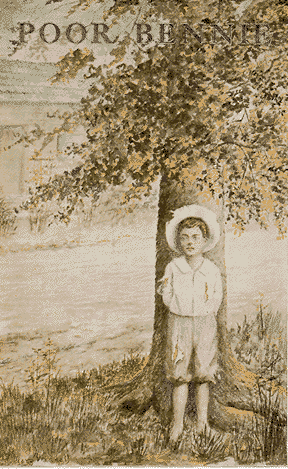Poor Bennie
by Mary Waddell
ALL who knew him called him "Poor Bennie;" and he was indeed a poor distressed little Bennie. Born of drunken parents, he had never a fair show in the world. A quarreling father and mother, and little of the comforts of life, while bad enough, were not the worst afflictions that had come to him. "Poor Bennie" had a weak, nervous little body that did not grow as fast as it should. Although he did not know it, he never would be strong and well like other children. Just as children may inherit from father or mother the Color of their eyes or hair or shape of features, so they may inherit weak and nervous bodies from parents who have poisoned their own bodies by alcohol taken in whisky, beer or wine. Sometimes drunkards' children have weak minds or minds that act slowly. These can not learn as quickly in school as other children.
Life seemed to hold very little of happiness for "Poor Bennie." He was only in the way at home, and his dullness provoked smiles from his more fortunate companions in school. No wonder the pale little face always wore a look of sadness. While he was still a small boy, there came a day when his father was compelled to give up his worthless life because of sickness caused by drink. He was laid away unmourned and, by those not affected by his evil life, soon forgotten. The mother, weakened in health from the same cause, was unable to make a living for herself. Soon after her husband's death she was taken to the "Poor House" to spend her few remaining days.
One bright summer morning, (it was the day before his mother was taken away) "Poor Bennie" was sitting in his favorite place under a big oak tree across the road from his wretched little home. This was the last time he would sit in the shade of his oak. He had always called it his tree. On nice days, when life in the house seemed unbearable because of drunken rows in which some blows fell on him, he always crept out to his tree. He was leaving it today. "Poor old tree," he said, as he lay on his back looking up through its branches. He felt sorry for the old friend that would be left all alone when he was gone. He wondered if other little boys would lay in it's shade. Would they be unhappy at home and love the tree as he did? He thought not. They would only care for a shady place to play when the sun was hot. "Poor old tree!" he said again. Just then the sound of a horse's hoofs upon the hard pike could be heard. He sprang up quickly. Yes, sure enough it was the old white horse every one knew as far as they could see it. Mr. Cornwell, the superintendent of the county "Chidrens' Home," was coming for him. He was leaving his home and his mother never to come back again. He ran into the house, but his mother lay on the bed in a drunken sleep. There was no one to say good bye. Only the tree waved it's branches in a silent farewell as he climbed into the buggy beside Mr. Cornwell. "Good-bye, old tree," he whispered as they drove away. He was very silent as they jogged along, only answering the few questions Mr. Cornwell asked him.The superintendent had taken many little waifs to the "Home," and he knew kind hearted Mrs. Cornwell, the matron, could do more by mothering the lonely little creatures than he could by talking.
Mrs. Cornwell met them when they arrived, and with the help of Miss King, the attendant for boys of Bennie's age, soon had him bathed and clad in the garments provided for the "Home" children. His own ragged, soiled clothing was sent to be burned. He sat down and watched the other boys, feeling very much like a "cat in a strange garret." When dinner was ready he was put in line and, with arms folded, marched out to the dining room where, seated around long tables, they were served with a plain but wholesome meal. That night he went to sleep in the first clean and comfortable bed he had ever been in; and for once he was not even the least bit hungry. He soon became acquainted and learned to do some light work. So as the days went by the strange feeling wore off.
With the coming of the golden rod and autumn leaves, school opened in the large room in the building set apart for that purpose. If Bennie learned slowly no one smiled now for many others were just as dull, and some could not learn as well as he. There were many children of drunken parents in the "Home."
Every Sunday Mr. and Mrs. Cornwell, assisted by the attendants, held Sunday School in the school room. It was here that Poor Bennie heard for the first time about the Great Friend who once was a little boy too. He learned that Jesus loved little children with unhappy lives like his. He often thought of these things when his weak body grew tired, and he stole away to his favorite resting spot in a grove near the house. He liked to be among the trees. It reminded him of his old friend, the oak.
When Christmas came there was a tree and gifts from kind hearted people for all the children. There was a good dinner, and at night, in the schoolroom, an entertainment in which nearly all had some part; yet Bennie's lonely little heart ached for something he did not have. He longed for the love of father and mother, and a home like he had seen when sent on an errand in the neighborhood.
On New Year's Day Miss King talked to the boys about beginning the year right. "It would be fine," said she, "if every boy would make a resolution today that he would do something to make himself better or some one else happier than he has ever done before. One boy might resolve to control his temper better than he did last year. Another should be less selfish and you, John Holcolm, might resolve to pay more attention when I am talking. Most of you should be able to find something you could do to help yourself or some one else."
Some of the boys were too dull to understand. Others, conscious of their failings, looked sullen or hung their heads. However, there were a few who honestly desired to correct some fault, or do some kind or useful thing.
But our story is of "Poor Bennie" rather than other boys. Both Miss King's words, and a picture of that happy home he had seen, came into his mind many times during the day. That night as he knelt to repeat the little prayer Miss King had taught him, he made his New Year's resolution. Some words he had learned in Sunday School kept repeating themselves in his mind. "When saw we thee a hungered, and fed thee? or thirsty, and gave thee drink? When saw we thee a stranger, and took thee in? or naked, and clothed thee? Or when saw we thee sick, or in prison, and came unto thee? And the King shall answer and say unto them, "Verily I say unto you, inasmuch as ye have done it unto one of the least of these, my brethren, ye have done it unto me." He resolved he would do something for people in distress every chance he had; for would it not be doing something for Jesus also? Then when he grew up he would do all he could to put the whisky men out of business. He would help save homes from the curse of strong drink, that hundreds of little children might be happy instead of miserable like he had been.
"Poor Bennie" knew that whenever it was possible to find good homes for them the children could no longer stay in the county home. It was not, therefore, wholly unexpected when Miss King told him they had found a place for him. He stood with downcast eyes and though he tried very hard to be brave, the big tears would roll down his cheeks. 0 why did he have to leave the people who had treated him with more kindness than he had ever known before!
"Will I ever get to see you again?" sobbed Bennie. "Yes, often," replied Miss King. "You will be with my sister, Mrs. Simpson, who lives near here and is all alone. She needs a boy to do errands, and you can be company for her. She is very lonely since her husband and her own little boy died. I often go to see her. Don't you remember the time I took you with me?"
How could he forget the most wonderful afternoon of his life! Bennie brightened at once and his eyes sparkled in pleasant anticipation; for motherly Mrs. Simpson was very nearly if not quite as nice as Miss King. She had given him such good things to eat. His mouth watered to think of it now. Perhaps he would be allowed to ride the pony again. He thought he would like to work for her. So promising to visit the "Home " often, it was a very happy little Bennie that bade his friends good bye. He soon learned to love Mrs. Simpson better than any one else.
One cold bright morning "Poor Bennie" was left all alone. Mrs. Simpson had walked across the fields to spend the day with Mrs. Fry. By noon the sky was overcast and snow flakes began falling slowly at first, but it was not too long till a regular blizzard had developed. As the day advanced and the drifts grew higher and higher, Bennie carried fuel enough to last all night. While trudging back and forth through the deep snow, he noticed the chickens were huddled in little groups over the premises and he thought he ought to drive them into shelter. But he found it a very difficult task. Instead of walking they would fly short distances at a time and not always in the direction of their house. So it was a very tired little boy that dragged himself into the warm living room when he had finished his "chores." It was quite dark now and still snowing and blowing. When he had waited till it was long past the time Mrs. Simpson had told him she would return, a great fear came over him. She must be on the way somewhere and it was so dark she would be unable to see. What if she should lose her way, become exhausted from floundering around in snow drifts and freeze to death. The thought was unbearable. Putting more fuel on the fire, he took the lantern from it's nail, lighted it and started across the fields. Great snow drifts blocked the way but he forced his already tired little body along, spurred on by his anxiety for his friend. How heavy his feet were! He could hardly drag them along. He thought it must be the cold wind in his face that made his head swim so. Mrs. Simpson might be just beyond him. "Oh, I must find her!" he exclaimed. But he sank exhausted; he could go no further. " 'Inasmuch as you have done it unto one of the least of these, my brethren, ye have done it unto me"' he murmured. How sleepy he was! He would just rest a moment and then he would go on. "I must-I must!" he repeated. But the eyelids closed and the storm raged on over the quiet little boy witli his face almost as white as the snow.
When the flakes began to fall rapidly Mrs. Simpson arose to tell Mrs. Fry good bye. "I must hurry home," she said, "before the show is any deeper."
"It is so early," replied Mrs. Fry. "Why not wait till Mr. Fry returns from town and he will drive you home. It is too bad for you to walk and I look for him soon."
It required but little urging to persuade Mrs. Simpson to wait. She knew Bennie would do his "chores" early and be warm and comfortable in the house. Even though his supper should be a little late it would not matter. She sat down to enjoy her visit, but when Mr. Fry did not come till dark, she felt afraid Bennie might worry about her; but it never occurred to her that he would try to meet her. Hastily donning he wraps she was soon on her way home. As Mr. Fry drove away after leaving her at her door, it was with a feeling of relief that she entered the house. All was bright and warm and the teakettle was singing merrily in the kitchen. "Bennie!" she called, but there was no reply. She searched indoors and about the premises, calling all the while, but he could not be found. Now thoroughly alarmed, she hurried back to the house and telephoned to several of the men in the neighborhood. His hat and coat were not in their accustomed place, and the lantern was gone. Thinking perhaps Bennie had gone to meet Mrs. Simpson, the men started across the fields four abreast, and after a long search they found the little fellow in his snowy bed. Tenderly they carried him home, but it was some time before the eyes opened as a faint smile spread over his face. For days he lay in his bed but was finally able to be up and walk about the house. But he never recovered from the exhaustion and exposure of that night. Like a mother Mrs. Simpson nursed him, but when the first flowers came they laid him to rest under the shade of the trees he loved so well. Had Bennie a strong body like most other children he would, quite likely, have reached Mr. Frys and suffered little, or no evil effects from his exposure. As Mrs. Simpson thought of this, her heart went out to all unfortunate children of drinking parents, and she determined to do all she could to stop the selling of whisky and other liquor.
Leaving her home in the care of others, she traveled from place to place, telling the story of "Poor Bennie," and pleading that other children be spared his experience.
Though Bennie did not live to fight the drink evil himself, yet by his short life of helpfulness to others, and especially by his great sacrifice for Mrs. Simpson, he was able to keep, through her, his resolution to help other children escape suffering, and have good homes in which to live.
---
Published by the Lincoln-Lee Legion, Westerville Ohio
A hard copy of this story can be found at the Anti-Saloon League Museum: Poor Bennie, opens a new window.
About the League
Museum Hours
Monday-Saturday: 9am-6pm
Closed on Saturday: 1-2pm
Closed on Sunday









